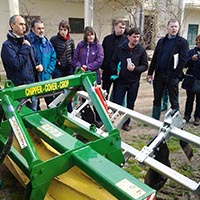SoilVeg project - no tillage organic vegetable production through roller crimper on test in 9 European countries
SoilVeg is an innovative European research project tackling the implementation of no tillage systems in organically managed vegetable production.

The aim of SoilVeg is to improve soil conservation and resource use through the introduction and management of Agro-ecological Service Crops (ASC). Reaching midway through the project, we are now presenting preliminary results.
SoilVeg is an innovative European research project tackling the implementation of no tillage systems in organically managed vegetable production. Its aim is to improve soil conservation and resource use through the introduction and management of Agro-ecological Service Crops (ASC).
No tillage systems can be based on the roller crimper technique to terminate ASCs growing prior to the cash crop. Its great potential has been shown for soil quality and fertility conservation, biodiversity improvements and energy savings.
For these reasons, organic farmers, worldwide, are attracted by this approach. Furthermore, the no tillage system may reduce the risk of nutrient losses from the soil/plant system and greenhouse gas soil emissions, thus having benefits for the whole society.
However, the introduction of no tillage techniques is very challenging and often reduces yield and quality, especially in Northern European countries, where soil and climate conditions may limit the implementation of this approach.
Reaching now midway through the project, the preliminary results are:
- ASC species selection and sowing rates are crucial aspects to be considered, to optimise the roller crimper technique locally. Indeed, ASC establishment and regrowth after termination have been identified as critical points that deserve attention. Moreover, the machinery used for the ASC termination and direct transplanting need to be appropriately tuned up and tailored according to the specific soil conditions;
- In general, we have observed a yield reductions in the no-tillage compared to ASC incorporation into soil (i.e. green manure) and no ASC. On average, yield reduction varied widely (10 – 50 % in respect to the best performing tilled variants);
- Larger horizontal roots or deeper roots were generally observed in the tilled variants;
- So far no significant differences in nutrient availability were observed between the no till and the tilled variants. However, first measurements seem to highlight that the no tillage system has a positive impact on soil microbial parameters, which are an important indicator of soil quality;
- Overall, weed density has been significantly lower in the no tilled and mulched variants than in the tilled ones; in some sites, this gap has been reduced during the cash crop period since mechanical weeding was performed in the tilled variants while it was not feasible in the no till ones;
- Preliminary outcomes indicate that weed communities established in the tilled variants were characterised by annual weeds, being more competitive (with higher specific leaf area and canopy height) and flowering during a wider period;
- Functional biodiversity of soil predator communities was enhanced in roller crimper ASC termination. Indeed, the density of ground beetles (Carabidae), rove beetles (Staphylinidae), and in some countries also spiders, was higher in comparison with green manured plots.
- Energy consumption was on average reduced of 20% per area unit in the no-tillage compared to the tilled variants where the ASC was incorporated into the soil;
- Results about greenhouse gas emission have been obtained by simulating the cropping systems functioning. Two of the most widespread simulation models EPIC and Daycent were preliminary adapted and validated for simulating no tillage vegetable cropping systems. Annual models predictions of soil C and N dynamic in the trials sites using EPIC and Daycent showed same trends regarding CO2 and N2O emissions from soils, accurately discriminating different mixtures of ASC species and termination techniques. Both model showed that both CO2 and N2O emissions decreased in the ASC roller crimper termination strategy compared to green manure.
- The experiments carried out in typical Mediterranean areas showed that the potential of organic vegetable systems to store carbon in soil is governed by humification-mineralisation processes, being also strongly controlled by ASC termination technique. On the other hand, simulations did not highlight differences between no tillage and tilled variants for nitrous oxide losses and ammonia volatilisations.
Thanks to the activities carried out so far, the research teams involved in SoilVeg project are progressively developing their expertise on the implementation of the no tillage system in organic vegetable production. Indeed, in all the countries involved in the project, researchers and farmers are participating in a continuous improvement process, sharing experiences on the set up and the use of roller crimpers to terminate ASC and on how to transplant the vegetable crop.
The results obtained at this stage of the project varied and, as expected, were strongly affected by local climate and soil conditions. However, we expect SoilVeg to identify - site by site - main constrains of no tillage systems based on the roller crimper technique. The researcher teams are working to tailor the technique at local level, improving its technical and environmental performance while, at the same time, mitigating its impact on yield and quality reduction.